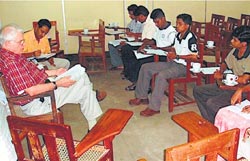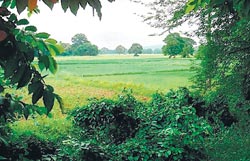
Cargills takes on the world with its modelThe Cargills Food City success of providing the consumer products from the field-to-shelf has not only attracted the attention of the prestigious Bill & Melinda Gates Foundation but also led to the model being possibly replicated in other parts of the wold. A visit that a team of agriculture and information specialists from the Foundation made to Sri Lanka this June, as part of a study tour of Africa and Asia for the WorldAgInfo Project, has resulted in the company being invited to share its experiences in contributing to the development of the Sri Lankan agriculture communities at two seminars in October and November in New York and Zambia, respectively.
The Cornell University International Symposiums on Agricultural Education and Information Systems are sponsored by the Foundation. Cargills (Ceylon) Ltd has a rich record of corporate social responsibility (CSR), a record that has grown and evolved to meet the intricacies of today’s business world and change the retail landscape of the country, while embedding CSR as their backbone. “We invest money in people and social responsibility is a way of life at Cargills,” Ranjit Page, Managing Director and Deputy Chairman, Cargills says, adding that this has led the company to put Sri Lanka on the map. “The WorldAginfo project is an attempt to explore the potential for new technologies to democratise agricultural education and information systems in Africa and Asia. The Cargills business model inspired these global experts,” Page said. The two workshops where Page and Janaki Kuruppu, Director – Strategic Planning have been invited as key resource persons will bring together agricultural scholars and practitioners with information/educational technology experts to explore a new frontier in agricultural education and extension. He said that they will share the Cargills business model and experience at the workshops which are limited to 40 participants made up of agricultural scientists, agricultural ministry representatives, agriculture faculty from African and Asian colleges/universities and private sector agriculture representatives, representatives of international agriculture organizations with experience in South Asia and Africa.
He said that during their visit to Sri Lanka in June this year, representatives of the Gates Foundation were given the opportunity to visit the Cargills collection centres, visit farms of various crop types that are benefiting from the Cargills model and hold focus group discussions with over 60 farmers who work with Cargills. In order to understand a non Cargills model, they also visited the Dambulla collection centre, and held similar discussions with farmers and farms that are doing their business on other private sector and government sector business models. In his visit report, Dr. Thane Therrill, Education Technology Specialist from Columbia University who was part of the delegation noted that, “Cargills was the most successful example of private enterprise helping farmers that we had the opportunity to observe. The clean and organised environment of the centre impressed us. The workers seem happy and the pay of US5 dollars a day is equal to the best farm rates”. Dr. Therrill also noted that the most important aspect of the processing centre was the use of shipping boxes. “These boxes are nothing special for us but the normal way of taking fruits and vegetables to market is in a big truck. As you would expect, the produce on the bottom does not do so well. Both India and Sri Lanka lose somewhere between 25 and 40% of produce to waste. In addition to transport damage and spoilage due to a lack of refrigeration, farmers will sometimes dump their goods if the market price does not justify the cost of shipping. Clearly one of the fast ways to increase production is to stop losing so much. Because of Cargill’s use of boxes, they only lose about 5% to shipping damage. What a big change using a small box can make,” he had said. He noted, “In India there is a major move of commercial firms into all elements of agriculture. Supermarkets and the like are finding that the only way to get the quality and quantity of produce they need is to control the entire production chain. However, there was a great deal of fear of this move”. Dr. Therril, had noted a difference in Sri Lanka. He said, “In Sri Lanka, however, everyone was excited and welcomed commercial participation. We later found out that the main reason is because a primary commercial firm, Cargills was being very socially responsible in how it worked with the farmers they work with. The farmers are not employees of Cargills but work in a partnership with it. Cargills supplies information about international product quality and the methods required to reach them”. Page noted that Cargills believe that the learnings from the workshops will contribute to a broader understanding of the opportunities and challenges that exist in this field. “Sri Lanka with its 19 million people is always negligible in the world platform. Our voice is drowned or stifled by overarching negative publicity. This opportunity that Cargills got is so valuable for Sri Lanka, because it gives us unhindered entry into the global intellectual forum to crusade our country,” he said, adding that it’s important to show the world that Sri Lanka too can be innovative in managing and transforming social issues. |
|
||
| || Front
Page | News
| Editorial
| Columns
| Sports
| Plus
| Financial
Times | International
| Mirror
| TV
Times | Funday Times|| |
| |
Copyright
2007 Wijeya
Newspapers Ltd.Colombo. Sri Lanka. |

